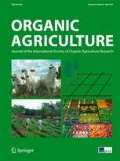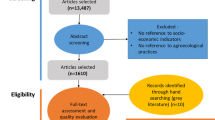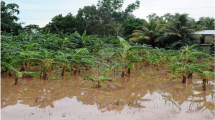Abstract
Adapting agricultural systems to the effects of climate change requires farm-specific innovations and adaptive measures. Such innovative measures were developed for organic farming systems in the federal state of Brandenburg, Germany by a regional innovation network using an action research approach. The goal of the presented approach was to address climate change-related farm-specific problems, develop specific adaptation measures and learn new approaches such as proactive risk management and strategic adaptive behaviour. In a cyclical process of analysis, planning, action and reflection, the network of researchers and organic farmers repeatedly used SWOT (strengths, weaknesses, opportunities and threats) analyses to structure the transdisciplinary innovation and adaption process. First, the organic farmers identified as main weaknesses the water and nitrogen supply likely to be worsened by climate change; then, farm-specific adaption measures were identified and tested by conducting on-farm experiments at six organic farms. By evaluating and thus adjusting and retesting the measures in consecutive trials, new farming methods were developed to increase diversification and decrease risk in organic farming practices. Along with the iterative process, the network was expanding and the collective learning process led to changes in attitudes and behaviour. A clear example is the stakeholders’ initially positive view of reduced tillage, which they later questioned and changed. The participating organic farmers proved to be active partners; their openness to innovation and their approach to problem solving make them well suited to action research. In adapting regions to climate change, these kinds of stakeholders will play a decisive role.

Similar content being viewed by others
References
Aase TH, Chapagain PS, Tiwari PC (2013) Innovation as an expression of adaptive capacity to change in Himalayan farming. Mt Res Dev 33:4–10. doi:10.1659/MRD-JOURNAL-D-12-00025.1
Bloch R, Bachinger J, Häring AM (2014) Praxisversuche zur Erhöhung der Anpassungskapazität im Ökolandbau. In: Bloch R, Bachinger J, Fohrmann R, Pfriem R (eds) Land- und Ernährungswirtschaft im Klimawandel. Auswirkungen, Anpassungsstrategien und Entscheidungshilfen. oekom verlag, München, pp 93–110
Bloch R, Wechsung F, Heß J, Bachinger J (2015) Climate change impacts of legume-grass swards: implications for organic farming in the Federal State of Brandenburg, Germany. Reg Environ Chang 15:405–414. doi:10.1007/s10113-014-0656-2
Checkland P, Holwell S (1998) Action research: its nature and validity. Syst Pract Action Res 11:9–21. doi:10.1023/A%3A1022908820784
Chmielewski F, Köhn W (1999) Impact of weather on yield components of spring cereals over 30 years. Agric Forest Meteorol 96:49–58
Darnhofer I, Bellon S, Dedieu B, Milestad R (2010) Adaptiveness to enhance the sustainability of farming systems. Rev Agron Sustain Dev 30:545–555. doi:10.1051/agro/2009053
Federal Ministry for the Environment, Nature Conservation and Nuclear Safety (2009) Combating climate change: the German adaptation strategy. http://www.germany.info/contentblob/2293498/Daten/426241/Adaptation_DD.pdf. Accessed 25 Jan 2015
Fichter K, Gleich A von, Pfriem R, Siebenhüner B (eds) (2010) Theoretische Grundlagen für erfolgreiche Klimaanpassungsstrategien. nordwest2050 – Berichte. http://www.nordwest2050.de/index_nw2050.php?obj=page&id=136&unid=6d644613feafeb6bd819e6ee4d84198f. Accessed 25 Jan 2015
Gerber A, Hoffman V (2007) Aktionsforschung. In: Kirchner-Heßler R, Gerber A, Konold W (eds) Nachhaltige Landnutzung durch Kooperation von Wissenschaft und Praxis. Gemeinsam gestalten. Oekom, München, pp 114–120
Gerstengarbe F-W, Badeck F-W, Hattermann F, Krysanova V, Lahmer W, Lasch P, Stock M, Suckow F, Wechsung F, Werner PC (2003) Studie zur klimatischen Entwicklung im Land Brandenburg bis 2055 und deren Auswirkungen auf den Wasserhaushalt, die Forst- und Landwirtschaft sowie die Ableitung erster Perspektiven. Potsdam Institute for Climate Impact Research (PIK), Potsdam
Hendlmeier, K (2015) HEKO-Landmaschinen. http://www.heko-landmaschinen.de/index.php?l=180. Accessed 24 Mar 2015
Knierim A, Nowicki P (2010) SWOT analysis: appraisal of a new tool in European rural development policies. Outlook Agric 39:65–72
König B, Kuntosch A, Bokelmann W, Doernberg A, Schwerdtner W, Busse M, Siebert R, Koschatzky K, Stahlecker T (2012) Nachhaltige innovationen in der landwirtschaft: komplexe herausforderungen im innovationssystem. Q J Econ Res 81:71–91. doi:10.3790/vjh.81.4.71
Krasny ME, Lundholm C, Plummer R (eds) (2011) Resilience in social-ecological systems. The role of learning and education. Routledge, Abingdon
Kroma MM (2006) Organic farmer networks: facilitating learning and innovation for sustainable agriculture. J Sustain Agric 28:5–28. doi:10.1300/J064v28n04_03
Läpple D (2013) Comparing attitudes and characteristics of organic, former organic and conventional farmers: evidence from Ireland. Renew Agric Food Syst 28:329–337. doi:10.1017/S1742170512000294
Laukkonen J, Blanco PK, Lenhart J, Keiner M, Cavric B, Kinuthia-Njenga C (2009) Combining climate change adaptation and mitigation measures at the local level. Habitat Int 33:287–292
Lewin K (2000) Resolving social conflicts and field theory in social science, 2nd edn. American Psychological Association, Washington, DC
Lüscher A, Hartwig UA, Suter D, Nösberger J (2000) Direct evidence that symbiotic N2 fixation in fertile grassland is an important trait for a strong response of plants to elevated atmospheric C02. Glob Chang Biol 6:655–662
McNiff J (2013) Action research: principles and practice, 3rd edn. Routledge, Abingdon
Milestad R, Darnhofer I (2003) Building farm resilience: the prospects and challenges of organic farming. J Sustain Agr 22:81–97
Morgan K, Murdoch J (2000) Organic vs. conventional agriculture: knowledge, power and innovation in the food chain. Geoforum 31:159–173
Orlowsky B, Gerstengarbe F, Werner P (2008) A resampling scheme for regional climate simulations and its performance compared to a dynamical RCM. Theor Appl Climatol 92(3–4):209–223. doi:10.1007/s00704-007-0352-y
Padel S (2001) Conversion to organic farming: a typical example of the diffusion of an innovation? Sociol Rural 41:40–61. doi:10.1111/1467-9523.00169
Piercy N, Giles W (1989) Making SWOT analysis work. Mark Intell Plan 7:5–7. doi:10.1108/EUM0000000001042
Rasmussen LB (2004) Action research—Scandinavian experiences. AI & Soc 18(1):21–43. doi:10.1007/s00146-003-0269-7
Reason P, Bradbury H (eds) (2008) The Sage handbook of action research: participative inquiry and practice, 2nd edn. London, Sage Publications
Reidsma P, Ewert F, Lansink AO, Leemans R (2010) Adaptation to climate change and climate variability in European agriculture: the importance of farm level responses. Eur J Agron 32:91–102
Reyer C, Bachinger J, Bloch R, Hattermann FF, Ibisch PL, Kreft S et al (2012) Climate change adaptation and sustainable regional development: a case study for the Federal State of Brandenburg, Germany. Reg Environ Chang 12:523–542
Rusch HP (2004) Bodenfruchtbarkeit. Eine Studie des biologischen Denkens, 7th edn. OLV Organischer Landbau-Verlag, Xanten
Sandhu HS, Wratten SD, Cullen R (2010) Organic agriculture and ecosystem services. Environ Sci Pol 13:1–7
Schäfer M, Nölting B, Engel A (2009) Organic agriculture as a new player in sustainable regional development? Case studies of rural areas in Eastern Germany. Int J Agric Resour Gov Ecol (IJARGE) 8:158–179
Siart S, Knierim A, Bloch R, Bachinger J (2012) Development of agricultural innovations in organic agriculture to adapt to climate change—results from a transdisciplinary R&D project in North-Eastern Germany. In: Producing and Reproducing Farmings Systems: New modes of organisation for sustainable food systems of tomorrow. Book of Abstracts 55. http://www.ifsa2012.dk/downloads/WS3_1/Sonja_Siart.pdf. Accessed 25 Jan 2015
Smit B, Wandel J (2006) Adaptation, adaptive capacity and vulnerability. Glob Environ Chang 16:282–292
Stein-Bachinger K, Fuchs S (2012) Protection strategies for farmland birds in legume-grass leys as trade-offs between nature conservation and farmers’ needs. Org Agric 2:145–162
Stolze M (1998) Organisationsformen ostdeutscher landwirtschaftlicher Grossbetriebe nach der Umstellung auf ökologischen Landbau. Agribusiness & food, vol 2. Agrimedia, Bergen
Wechsung F, Gerstengarbe F-, Lasch P, Lüttger A (2008) Die Ertragsfähigkeit ostdeutscher Ackerflächen unter Klimawandel. PIK-Report, Potsdam. http://www.pik-potsdam.de/research/publications/pikreports/.files/pr112.pdf. Accessed 25 Jan 2015
Yohe G, Tol RSJ (2002) Indicators for social and economic coping capacity—moving toward a working definition of adaptive capacity. Glob Environ Chang 12:25–40
Zadoks J, Chang T, Konzak C (1974) A decimal code for the growth stages of cereals. Weed Res 14:415–421
Zapf W (1989) Über soziale Innovationen. Soz Welt 40:170–183
Acknowledgments
This research was made possible with the support of all practitioners who participated in the INKA BB network, and without whom this research would have not been possible. Though it is not possible to list all the names, we would like to extend our special thanks to the farmers Sascha Philipp, Stefan Palme and Peter Krentz who carried out the on-farm experiments. We would also like to thank the two reviewers and Professor Gerold Rahmann for their thoughtful and insightful comments and helpful feedback. This study was financed by the Federal Ministry of Education and Research, Germany and the Brandenburg Ministry of Sciences, Research and Cultural Affairs.
Author information
Authors and Affiliations
Corresponding author
Rights and permissions
About this article
Cite this article
Bloch, R., Knierim, A., Häring, AM. et al. Increasing the adaptive capacity of organic farming systems in the face of climate change using action research methods. Org. Agr. 6, 139–151 (2016). https://doi.org/10.1007/s13165-015-0123-5
Received:
Accepted:
Published:
Issue Date:
DOI: https://doi.org/10.1007/s13165-015-0123-5




